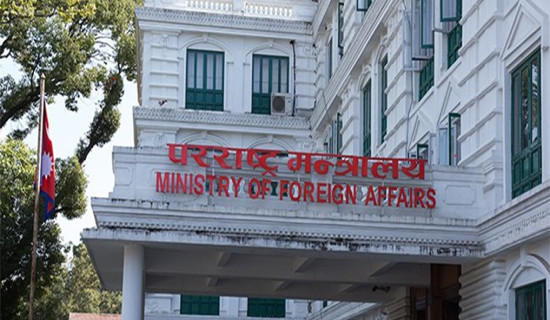- Wednesday, 4 March 2026
TU Faces Drop In Graduates
Tribhuban University, once a beacon of the country's educational excellence, is now experiencing a troubling trend. The number of students graduating with a B.Sc. in physics has significantly declined from 2072 B.S. to 2078 B.S. This alarming drop poses a threat to the university’s reputation and the nation’s scientific workforce.
Over the past several years, the number of graduates has continuously decreased. In 2072 B.S., around 9,000 students graduated, but this number dropped to approximately 7,500 in 2073 B.S. The trend persisted, with about 7,000 graduates in 2074 B.S., around 6,000 in 2075 B.S., and roughly 5,000 in 2076 B.S. The figures fell below 5,000 in 2077 B.S., and by 2078 B.S., fewer than 2,000 students graduated. This steady decline highlights a significant issue that needs urgent attention. Several factors contribute to the declining number of graduates.
Firstly, fewer students are enrolling in the 4-year B.Sc. programme. The curriculum may not be as attractive. Secondly, there are higher dropout rates, with many students leaving before completing their degrees, possibly realising that their qualifications may not secure them better jobs than those obtained through personal connections. Additionally, the quality of education appears to be declining, discouraging students who value genuine learning over rote memorisation.
Economic issues
Economic and social issues also play a role. Financial problems and rising inflation make it difficult for students to afford tuition fee. Peer influence and social trends push students to study abroad, seeing their peers achieve success overseas. Many believe that pursuing education abroad offers better job opportunities, higher salaries, and advanced research facilities, making countries like the USA, UK, Canada, and Australia attractive destinations.
If this trend continues, Tribhuwan University might face several significant challenges. Firstly, its reputation could suffer as the number of graduates dwindles, potentially making the institution less respected. While the university’s historical significance might still offer some credibility, it won't be enough to maintain its standing in the academic world. Furthermore, there could be a shortage of qualified professionals in science and other fields, exacerbating the existing problem of having unqualified individuals in important positions. This decline in educated workers might also harm the country's economy, which heavily relies on remittances and foreign assistance.
The brain drain issue is another critical concern. The trend of students leaving for better educational and career opportunities abroad could accelerate, leading to a further loss of talent. This situation is similar to how some African countries have struggled to rebuild their economies after prolonged periods of brain drain and inadequate investment in education. The exodus of students in search of better prospects abroad not only depletes the talent pool but also reflects systemic issues within the national education system and the broader socio-economic landscape.
Understanding and addressing these issues is crucial for the university’s success and for maintaining a strong scientific community in Nepal. Will a taskforce composed of the people responsible for the decline in the TU education system solve it? A line graph shows the total number of graduates each year from 2072 to 2078 B.S., clearly highlighting the decline. A study reveals that in 2078 B.S., 84.7 per cent of graduates were male and 15.3 per cent were female.
Key players in this story include politicians who are great at making empty promises, party members who ensure nothing changes by acting as if education is a danger to them, and professors who haven’t updated their lecture notes in years. The old, deteriorating buildings and outdated labs add to the problem. The focus on impractical education, emphasising memorisation over real-world skills means graduates are ready for jobs that no longer exist. University leaders fail each year to start job-oriented programmes that meet market needs, sticking to an outdated curriculum that requires urgent updates.
Research-based learning
Several steps can help Tribhuban University overcome its challenges. First, courses should be updated to match international standards and focus more on practical and research-based learning. Professors should be required to publish research annually, and offering training and opportunities for international collaborations can improve the quality of education. Increasing government funding can help upgrade labs and create innovation hubs for research and development. Upgrading buildings and adding better digital amenities are necessary to provide a conducive learning environment.
Partnering with companies to offer internships and jobs, and including courses on entrepreneurship, can help students get ready for the job market. Making the university's governance transparent and decentralised, and involving alumni and students in decision-making, can improve how the university is managed. Finally, forming partnerships with international universities and seeking global accreditation can raise the university's global standing and attract more students. By taking these steps, Tribhuban University can improve its reputation and retain talented students. Addressing these challenges head-on is vital for the university’s future and the country’s progress in science.
(The authors are researchers.)
















